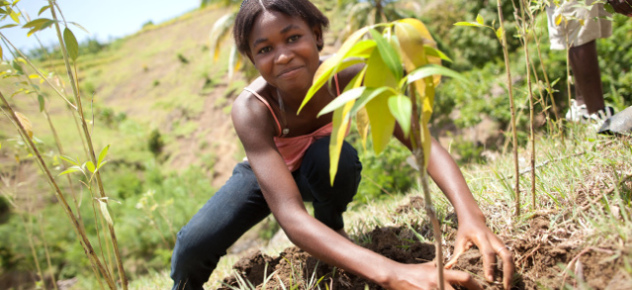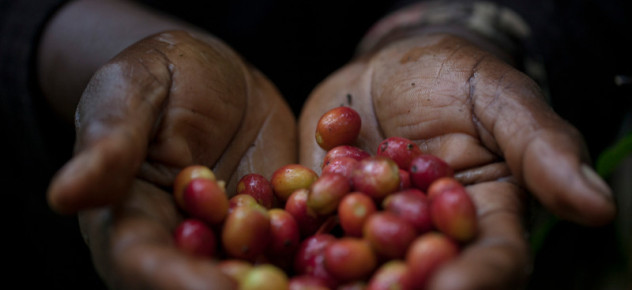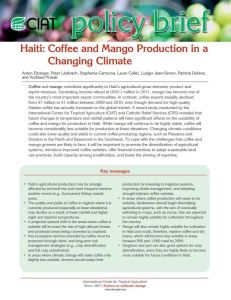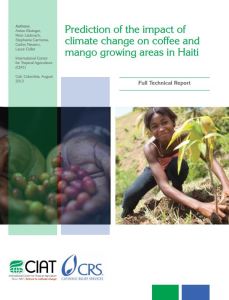
While changes in temperature and rainfall patterns are expected to reduce the area suitable for cultivating coffee in Haiti, climate change poses little threat to the production of mango, another of Haiti’s key export commodities. Credit: Benjamin Depp / CRS
Agriculture is the most important sector of Haiti’s economy, contributing 25% of its gross domestic product and employing almost 60% of the labor force. Already seriously damaged by the major earthquake that struck the country in 2010, the sector is further threatened by the effects of climate change. Models predict an increase of 1.8°C in the average temperature by 2050 and a 10% decline in rainfall during the driest month. According to a recent study by CIAT and Catholic Relief Services (CRS), this is especially worrisome news for Haiti’s coffee producers.
The value of the country’s coffee exports has already declined from US$7 to $1 million between 2000 and 2010, and changes in temperature and rainfall patterns are expected to reduce the area suitable for cultivating this crop. Coffee is currently grown at altitudes ranging from 400 meters above sea level in the North to 1,300 meters in the South. Climate change will shift the coffee-growing area to higher elevations with cooler temperatures. And this could put the few high-altitude forests that remain at risk of being converted to cropland.
Climate change has #coffee growers in #Haiti seeking higher ground: http://t.co/TdDpOcgOdL Via @NPR
— CRS News (@CRSnews) October 28, 2014
“Coffee growers in areas that will become only slightly less suitable for coffee – basically between 1,200 and 1,500 meters above sea level – will need to adapt to new climatic conditions if they want to maintain their production,” said CIAT’s Climate Change Theme leader Peter Läderach. “This means adopting drought-tolerant coffee varieties, irrigation schemes, and shade management.”
Läderach and co-authors of the CIAT-CRS study also recommend that farmers start diversifying their production in areas below 1,200 meters, which will soon completely cease to be suitable for coffee.The good news is that climate change poses little threat to the production of mango, another of Haiti’s key export commodities, which alone generated income of $11 million in 2011.
Other climate-resilient options include cocoa, groundnut, sorghum, and yam. Cocoa is particularly promising, because conditions in Haiti are very suitable for its production and will remain so, despite climate change. Moreover, the crop has good economic prospects and is grown in agroforestry systems that deliver environmental services (such as soil cover, carbon sequestration, biodiversity, and water storage) equivalent to those provided by coffee-based systems.

Changes in temperature and rainfall patterns are expected to reduce the area suitable for cultivating coffee in Haiti. Credit: Sara A. Fajardo / CRS
“Incentives including subsidies, insurance, and payment for ecosystem services could be put in place to reward farmers who choose to grow cocoa rather than another crop. This would promote sustainable soil management, preserve remaining forests, and maintain essential ecosystem services,” said Anton Eitzinger, a spatial analyst and climate change specialist at CIAT and lead author of the study.
Now is the time for Haiti and its development partners to take strategic measures to avoid immediate and future economic losses, and detrimental social and environmental impacts. Building on the collaborative study, CRS is bringing together key stakeholders to initiate a dialogue and take the necessary actions to promptly adapt the country’s agriculture to climate change.
“There is a lot of consensus among everyone, including government actors, that we need to accept that climate change is real and therefore we need to start putting measures in place to mitigate the effects,” said Jeff McIntosh, CRS deputy director in Haiti during a conference organized by CIAT and CRS in Port-au-Prince on 28 August 2014. “There is time to do something.”
Further work will be needed to target and prioritize interventions, including more specific mapping of areas in the country that will become more or less suitable for particular crops. Researchers will also need to gain a better understanding of farmers’ adaptive capacity. In addition, strategic investments are needed, particularly to develop fragile higher-altitude areas, while taking into account the need to conserve natural resources.
Thomas Jacques, Minister of Agriculture, Natural Resources and Rural Development, said in the same conference that “in Haiti, climate change is felt more acutely given our geographic location and the fragility of our various ecosystems.”
But the impacts of climate change, if understood and addressed in a timely manner, can be turned into opportunities for the country’s agricultural sector. Based on its experience in helping climate proof agriculture in Colombia, CIAT stands ready to provide further support for Haiti’s farmers and other key decision makers.
To know more:
 Haiti: Coffee and mango production under a changing climate. CIAT Policy Brief No.16.
Haiti: Coffee and mango production under a changing climate. CIAT Policy Brief No.16.

Prevision of the impacts of climate change on mango and coffee production in Haiti